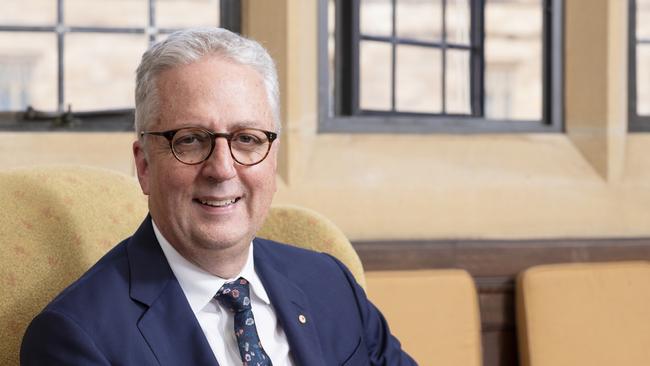Foreign student tax ‘dangerous’, says Uni of Sydney chief Mark Scott
International student tax would be ‘dangerous and short term policy’ says new Group of Eight universities chair Mark Scott.

University of Sydney vice-chancellor Mark Scott is the new chair of the research-intensive Group of Eight universities and faces the task of dealing with looming federal government policies that are not expected to align with the elite university group’s priorities.
Professor Scott, a non-academic who was a newcomer to higher education when appointed to lead the University of Sydney in 2021, is well practised in dealing with government after previous stints as head of the NSW Education Department and managing director of the ABC.
The Go8 will have a source of continuity in chief executive Vicki Thomson, who has been in the role since 2015 and been reappointed for the next five years.
The final report of the government’s Universities Accord review of higher education, to be released late next month, is likely to put a tax on universities’ international student income – which Go8 institutions rely on to fund their research budgets – and also slow-walk calls to boost Australia’s research spending.
Professor Scott said an international student tax would be a “dangerous and short-term policy intervention”.
He said that national research performance – in which the Go8 universities dominate – was a standout area of Australian educational achievement compared to, for example, the poor participation rates for early childhood education or lacklustre school performance.
“So I think it would be very short-term for any government or policymaker to turn around and say, ‘We will target the one area where the country has been doing exceptionally well in global terms’,” Professor Scott said.
“Revenue from international students has provided the investment that has been necessary in research in this country that has come at the same time as government … and business investment in research has been in significant long-term decline.”
He said he understood why the government’s work on the Accord had focused on increasing the number of disadvantaged students who get a university education and ensuring graduates have the skills required for modern jobs.
“But to focus on those things does not take away at all from the importance of research … particularly for the long-term strategic growth of the country,” Professor Scott said.
“We shouldn’t be in a position where we’re sacrificing our strength in one area to make further investments in others.”
In a submission lodged this week to a Senate committee examining a bill making changes to the Australian Research Council, the Go8 urges that 65 per cent of ARC grant funding to universities should be allocated to basic research.
Professor Scott said a commitment to basic research was a necessary foundation for future success. “Unless there is a guaranteed investment in basic research now, there’s nothing to translate and commercialise in five, 10, 15 years from now,” he said.
Professor Scott’s two-year term as Go8 chair takes him up to 2026, when the group will admit the new Adelaide University, a merger of the University of Adelaide and the University of South Australia. Because UniSA does not have a high concentration of research, the newly merged Adelaide University will not, at least for some years, fit the research-intensive profile of Group of Eight members.
The University of Adelaide, a Go8 member, will cease to exist and Professor Scott said the group had debated whether to admit the new Adelaide University.
“We decided we wanted to keep that important university in South Australia in the Go8. I think there’s an expectation that its research performance will improve over time, and that will be a focus,” he said.




To join the conversation, please log in. Don't have an account? Register
Join the conversation, you are commenting as Logout